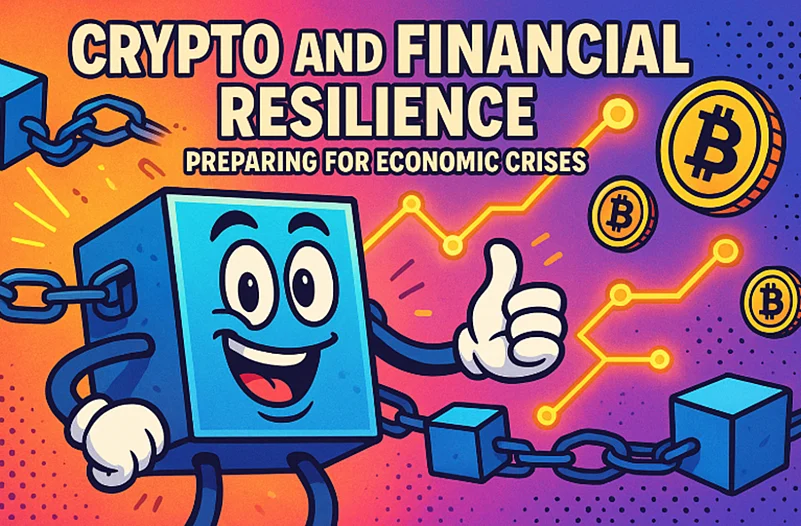In a volatile global economy, economic stability is an elusive fantasy. Recessions, inflation, devaluation of currencies, and bank failures have time and again illustrated to us the speed at which conventional financial systems can crumble. As the world continues to change, so should our plan for preserving wealth. In search of economic strength, cryptocurrencies have risen as a disruptor as well as a solution.
But how exactly is crypto involved in the conversation about financial preparedness? And can it really help people and communities’ weather economic hard times?
Understanding Financial Resilience in Today's World
Financial strength is more than the mere reality that one has a savings account. It's getting someone ready to weather financial shocks—a loss of a job, a currency crisis, or a total failure of the financial system of institutions. Conventional financial systems are highly interdependent and highly centralized in control by central powers. Although these systems have given structure for decades, they also contain inherent dangers.
The global economic crisis of 2008 and the consequences thereof, such as bank collapses in large economies, have made us realize the pitfalls of dependence on centralized systems. In hyperinflating or capital-restricted countries, citizens lose their riches overnight. Such issues have caused individuals to look for alternatives, and crypto has increasingly become a focus as one of them.
Crypto as a Hedge: Not a Silver Bullet, But an Option
Cryptocurrencies such as Bitcoin were born in times of economic crisis. The concept was simple but powerful: design a decentralized currency that is not tied to banks and governments. Whereas money can be printed or faked, most cryptocurrencies have fixed amounts and are controlled by open-source code.
For people living in economically unstable economies, cryptocurrencies provide a means of safeguarding their wealth. They can preserve value, make cross-border payments, and even employ global financial instruments without having access to a conventional bank account.
But crypto markets aren't volatility-proof, either. Prices are volatile and expensive. This isn't the same thing as crypto substituting for traditional financial planning, though, but more that it can be considered one piece of a bigger strategy of resiliency.
Access and Inclusion: A Double-Edged Sword
One of the most exciting things about crypto is that it has the power to drive financial inclusion. There are millions of people all over the world without bank accounts, mostly in developing economies. With just a smartphone and an internet connection, they can now join the digital economy using crypto wallets, peer-to-peer networks, and decentralized finance (DeFi) platforms.
But financial literacy is not promised by accessibility alone. With crypto adoption increasing, education is becoming increasingly important. Not knowing the mechanism of digital wallets, securing private keys ineffectively, or being taken in by a scam can cause huge losses. Hence, awareness and careful engagement are required.
Learning from Real-World Scenarios
During economic crises in countries like Venezuela, Lebanon, and Turkey, residents have increasingly used crypto as a way to safeguard their wealth. Such instances show that, if fiat currency collapses or becomes inaccessible, crypto can act as an alternative. It turns into a store of value, a medium of exchange, and even sometimes a symbol of economic freedom.
At the same time, governments and regulators are entering crypto more and more, as they seek to keep up with innovation and regulation. The changing regulatory landscape will dictate just how secure and available crypto will be in the event of future economic slumps.
Looking Ahead: Developing Individual Economic Resilience
Diversifying your revenue streams, holding emergency funds, keeping up on what's happening in your area's economy, and trying out emerging technologies like crypto all help create a strong foundation for your finances.
Cryptocurrencies provide one such tool. No silver bullet, maybe, but they are another paradigm for money, control, and access. Riding out the turmoil of the global economy, it can be reasonable to embrace financial education—i.e., digital asset literacy—to enable people to make informed choices, safeguard assets, and conform in an evolving world.
Conclusion
Economic downturns can be unavoidable, but being prepared is what will make or break it. Cryptocurrencies, with their decentralized systems and presence everywhere, bring about a new age of financial security. For the risk-taker who is willing to learn, adapt, and venture into this field cautiously, crypto can be a valuable partner in establishing a secure future.
By knowing its potential and its pitfalls, we can start to redefine financial security—not as a privilege, but as a right supported by innovation.














